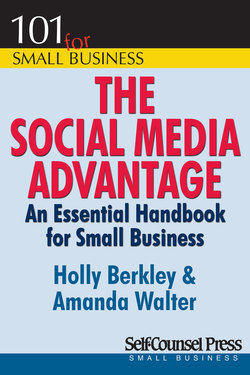Читать книгу The Social Media Advantage - Holly Berkley - Страница 13
На сайте Литреса книга снята с продажи.
Who’s On Facebook?
ОглавлениеFirst and foremost, if you are a business you need to operate under a Facebook page, not a personal Facebook profile. We realize this frustrates many business owners who have already built up significant following under their personal Facebook page.
However, Facebook clearly states in its terms and conditions that profiles are meant for individuals and pages are meant for groups, businesses and organizations. In fact, if you have your business functioning under a profile rather than a fan page, Facebook can shut it down, and all of your “friends” will literally disappear. Trust us! This happened to a client who insisted on using a Facebook profile page rather than fan page.
It’s understandable why people don’t want to switch over to a fan page from a profile page; it takes time to build up friends, for one. Fortunately, in April 2011, Facebook added the “Profile to Page Migration” tool that allows you to easily convert your existing profile to a business page and all of your friends to “likes.” We suggest you download a backup of your profile before making this transfer as there is no way to convert a page back to a user profile once you engage the tool, and since Facebook profiles function differently than Facebook pages, not all content and information gets carried over. We suggest that you visit http://www.facebook.com/note.php?note_id=214139221935487 to learn more about backing up your profile page and how to use the page migration tool.
Once you start operating under a Facebook page, you’ll notice gathering friends, or “Likes” is a bit more difficult than when you are operating under a personal profile. In the beginning, you may have to make posts on your personal profile to encourage people to switch over and start “liking” and interacting on your new business page. With a Facebook Page, you can not directly invite people to “like” you anymore. Posting the Facebook “like*” widget on your blog posts and web site are other obvious ways to encourage people to “like” you and therefore join your fan page.
Although Facebook pages are slower to grow and may not give you the direct, measurable impact of LinkedIn, Twitter and a blog, it is still highly recommended to get started now. By 2013, 62% of web users and almost half (47.6%) of the overall U.S. population will be on Facebook (eMarketer 2011). And Facebook users are an active group with 50% logging in every day. In March 2011, Google changed its algorithm to give even more weight to social authority and online reputation. Now the number of “likes” a company has on Facebook directly impacts its overall Google ranking. Read more about Facebook group and fan pages in Chapter 3.
When Daryl H. Bryant released his new book MS Living Symptom Free, he turned to Facebook as a primary tool for building awareness and ultimately generating book sales.
“Social media was always a crucial part of the book’s promotional and marketing plan”, said Rania Eldekki of Hudson Horizons, (hudsonhorizons.com) an integrated web agency responsible for helping Bryant launch his Facebook page. “A Facebook campaign was initially developed to increase fan base and interaction within the MS community. As the campaign progressed, tactics were eventually directed towards increasing book sales,” explained Eldekki.
Bryant himself was responsible for posting and interacting with participants on his MS Facebook community, helping to give it a more authentic voice than an outside marketing agency could alone. The passionate fan base of the Facebook page continues to grow, which has helped MS Living Symptom Free become a top ranked book on Multiple Sclerosis on Amazon.
How does this story help your business? By realizing that the use of social media, especially Facebook, is about building authentic relationships before you can close a sale. It takes a bit more time than a simple pay-per-click search ad, but the benefits are longer lasting and ultimately will decrease your client acquisition costs.
The value of a Facebook “Like” of your business or product is ultimately the value of that person’s network. According to Facebook, the average user has 130 connections. Also, 29.6% of shoppers say they have discovered a new product after a friend has “liked” it on Facebook.
